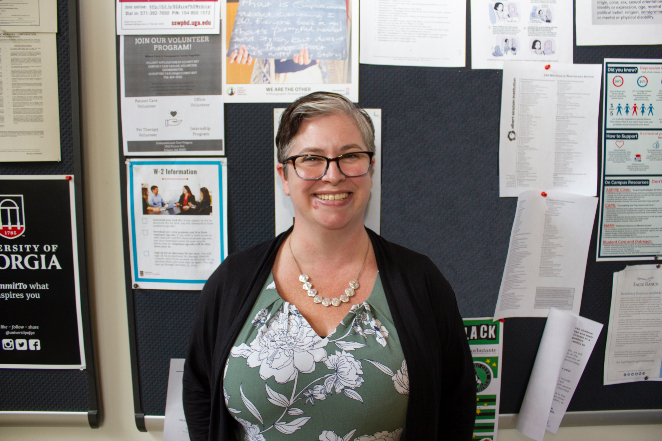by Laurie Anderson | April 15, 2020
More than ever, it’s important to manage stress.
That’s what Caroline Sharkey tells her clients, who range in age from children to adults.
The Philadelphia native, who is earning a doctorate in social work at the University of Georgia, is a clinical supervisor and psychotherapist at Project Family LLC, a community mental health agency serving youth and families in northeast Georgia.
Since the onset of school and workplace closures, she has been using telehealth technology to see clients remotely. A growing number, she says, are extremely anxious.
“Many people have to work from home now. Well guess what? They are doing it with kids yelling in the background and their dogs barking, not to mention everything else that life brings,” said Sharkey. “Being on the clock means something different right now.”
Other clients are unemployed, or live with family members who are unemployed. It is hard enough to provide for loved ones with no money coming in, she said, but doing it under current circumstances is even harder.
The mother of three urges her clients – children and adults alike – to give themselves “permission to feel exhausted” and to take time out for self-care.
To do that, Sharkey suggests setting boundaries, such as limiting the amount of news one follows, setting realistic expectations with employers, and establishing or maintaining a routine that includes consistent meal times and bedtime habits. Routine doesn’t mean drudgery, though.
“I encourage my young clients to enjoy sleeping in a little bit later than usual, to take advantage of the mornings for online learning and required school work, and then do something that gets them moving. Physical movement helps in so many ways!”
One young client found that wearing her school uniform was a great motivator.
“She told me she had to start getting up at a specific time and put on her uniform in order to convince herself to do online learning,” said Sharkey. “She said, ‘I miss having something specific to do every day!’”
Everyone should ease up on expectations, too, said the therapist.
“I tell people to be kind to themselves and recognize that they may not be able to do all of the things they normally do. It’s important to also realize that some of the fatigue and discombobulation people are experiencing may be due to stress and navigating new routines.”
Sharkey’s own experience informs her advice. On Sept. 11, 2001, she was teaching elementary and middle school students in Albany, New York, when the World Trade Center was attacked. The teacher and her students watched via television as the twin towers burned and fell.
“Many of the students had connections to family in the city and some lost loved ones,” she recalled.
Today, the lessons from that horrific event help her navigate the current crisis.
“What we learned over the past 20 years is that we need to recognize the signs and symptoms of acute stress and traumatic, long-term stress.”
To reach others who are impacted by traumatic stress but unlikely to visit her office, Sharkey coordinates the Trauma-Informed Library Transformation project. The collaboration between Athens-Clarke County’s main library and the UGA School of Social Work helps library patrons who are struggling with trauma-related issues. The project continues despite the library’s current closure, as Sharkey oversees development of a database of Athens-area COVID-19 assets.
“Resources are harder to come by, with so much being limited to electronic interactions, but the community is doing its best to pool together efforts and identify supports, particularly financial and food supports, to help families,” she said.
Helpers also need help, so Sharkey now makes time for front-line mental health and substance use recovery workers as well. For these responders she organizes and conducts traumatic stress and secondary trauma trainings, group mental health check-ins to recognize problems, and individual supports.
“This is an amazing community and people are putting themselves out there to ensure that communities and individuals have what they need,” said Sharkey. “What I do is a ripple in a very large lake, but I hope that people know many of us are here to help in any way we can.”

